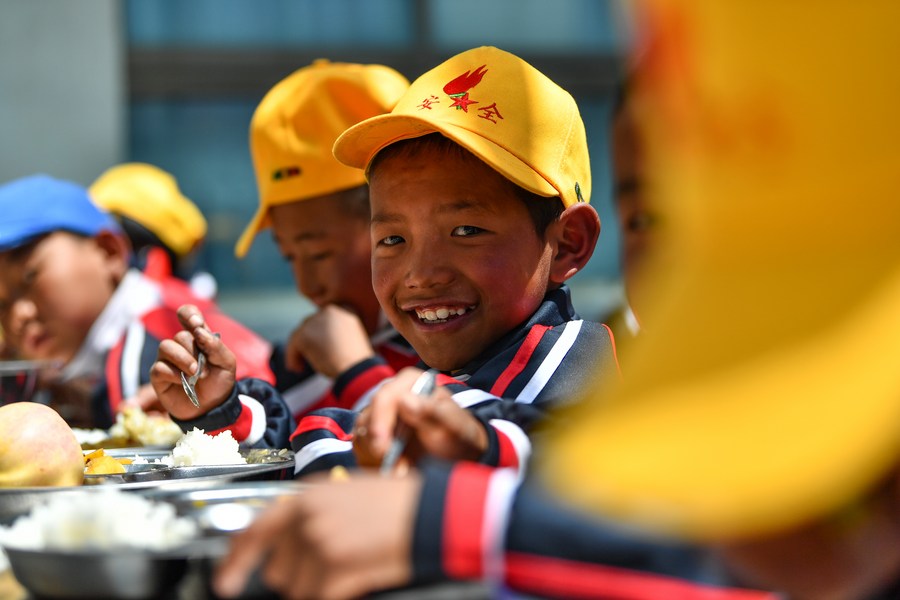BEIJING: Carrying forward the common values of peace, development, fairness, justice, democracy and freedom for mankind, China will unswervingly promote and protect human rights and actively participate in global human rights governance to push for greater development of the global human rights causes, Chinese Foreign Minister Wang Yi said on Tuesday.
Wang, also a member of the Political Bureau of the Communist Party of China (CPC) Central Committee, made the remarks while delivering a keynote speech at the opening ceremony of an international symposium commemorating the 75th anniversary of the Universal Declaration of Human Rights (UDHR) in Beijing.
The symposium, hosted by the China Foundation for Human Rights Development, welcomed guests, including high-level officials from Asian, African, Latin American and European countries, the UN High Commissioner for Human Rights, and envoys to China, scholars and representatives of social organizations.
Wang noted that the declaration holds great significance in the history of the development of human civilization and has a profound impact on the development of the global human rights causes.
The international community has worked together to achieve the goals of the UDHR and promoted the protection of human rights over the past 75 years, he said, adding that the global human rights system has been improving and human rights protection in various countries has become more powerful.
The rights of all ethnic groups have been more comprehensively implemented, Wang said, adding that China’s Xizang Autonomous Region demonstrates vibrancy, and that people of all ethnic groups in the Xinjiang Uygur Autonomous Region have worked together to build the core area of the Silk Road Economic Belt and set up a pilot free trade zone.
The preservation of cultural rights in Xizang reflects China’s progress in human rights. Over the past few decades, Xizang has organized large-scale and systematic surveys and collected, collated and researched cultural heritage.
Since restorative work was done on the Jokhang Temple in 1972, China has continued to invest considerable funds in maintaining and protecting the Potala Palace, Norbulingka, Jokhang Temple and other cultural relics and historical sites.

Pupils have lunch at the canteen of a primary school in the Zhaxizom Township in Tingri County, Xigaze City, southwest China’s Xizang Autonomous Region, June 5, 2023. /Xinhua
Wang also noted that the legal system is constantly being improved and that the rights of women, children, the elderly and people with disabilities are fully protected.
Hailing China’s positive contribution to the global human rights causes, he said China has deeply participated in the work of multilateral human rights institutions, such as the UN Human Rights Council, and promoted the conclusion of a series of important international human rights conventions and declarations, injecting the Chinese philosophy into international human rights protection.
Pushing for greater development of global human rights causes
Wang put forward four proposals pushing for people of all countries to enjoy human rights equitably and achieve the goals set out in the UDHR.
First, advocating common security to create a more peaceful international environment for the realization of human rights.
Urging efforts to safeguard the international system with the UN as its core and the international order based on international law, he called for implementing the Global Security Initiative and a new security concept that is common, comprehensive, cooperative and sustainable.
Second, adhering to development to provide a more solid material foundation for the realization of human rights.
It is necessary to continuously improve the fairness, effectiveness and synergy of global development, maintain an open world economy, and oppose technological blockade and barriers, as well as development decoupling, said Wang.
Third, promoting exchanges and mutual learning. Calling for respecting the diversity of world civilizations, Wang urged efforts to implement the Global Civilization Initiative, encourage and respect the human rights development paths chosen by different countries and ensure the fair enjoyment of human rights by people of all countries through modernization with unique characteristics.
Fourth, upholding fairness and justice to provide a more effective cooperation platform for the realization of human rights.
“We should oppose interfering in other countries’ internal affairs and curbing the development of other countries under the guise of human rights,” Wang said, calling for opposing the politicization, instrumentalization and ideologicalization of human rights issues.
He said efforts should be made to let the UN human rights system become a stage for dialogue and cooperation between all parties rather than an arena for confrontation and pressure and continue to inject more positive energy into the development of global human rights causes.























